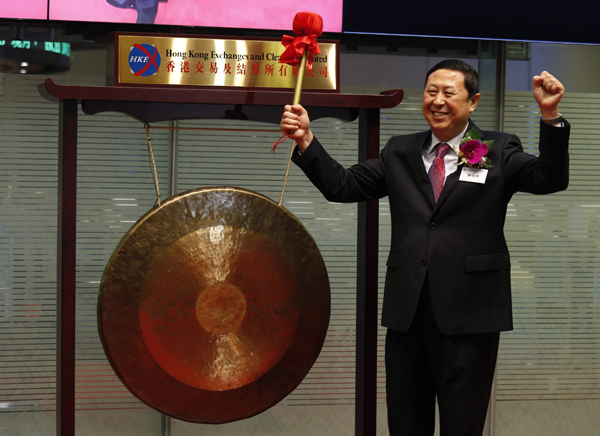 |
|
Zheng Minghui, chairman of the board of the Qingdao Port Group, reacts after hitting the gong during the debut of Qingdao Port International Co at the Hong Kong Stock Exchange on Friday. Reuters |
Shares of Qingdao Port International Co Ltd, operator of the world's seventh busiest port by shipping volume tumbled in their Hong Kong trading debut on Friday following lukewarm response from investors and concerns that the ongoing metal financing probe would hurt the mainland's third-largest foreign trade port.
Qingdao Port International, the primary operator of the port of Qingdao, in northeast China's Shandong province, saw its shares slide 1.33 percent from their listing price of HK$3.76 per share to close at HK$3.71 per share on the first day of trading at the Hong Kong Stock Exchange.
After a rare fixed price initial public offering, the port operator announced on Thursday that the net proceeds from the global offering was around HK$2.49 billion. According to its prospectus, 90 percent of the funds raised, or HK$2.24 billion, would be used for setting up cargo handling facilities at the Dongjiakou Port Area, a part of the Qingdao Port that will be able to handle 300 million metric tons of cargo every year after completion.
The lukewarm response from retail investors in Hong Kong also contributed to the share price decline. Only 11.89 million shares were grabbed in the local offering, equivalent to approximately 15 percent of the total amount available for subscription. The rest was purchased by international buyers, the company said in an announcement on Thursday. A total of 776.38 million shares were on offer initially.
"People are obviously concerned over the ongoing metal financing probe at Qingdao Port," said Stuwart Chen, an analyst with the Hong Kong-based Sun Hung Kai Financial Institutional Research.
"At this moment we see no fundamental impact from the investigation, but as very little is known to the outsiders, it's hard to estimate the scale of the wrongdoing. Given that liquidity remains tight on the mainland, there could be more than one company fooling banks in the same way."
|
 |
 |
